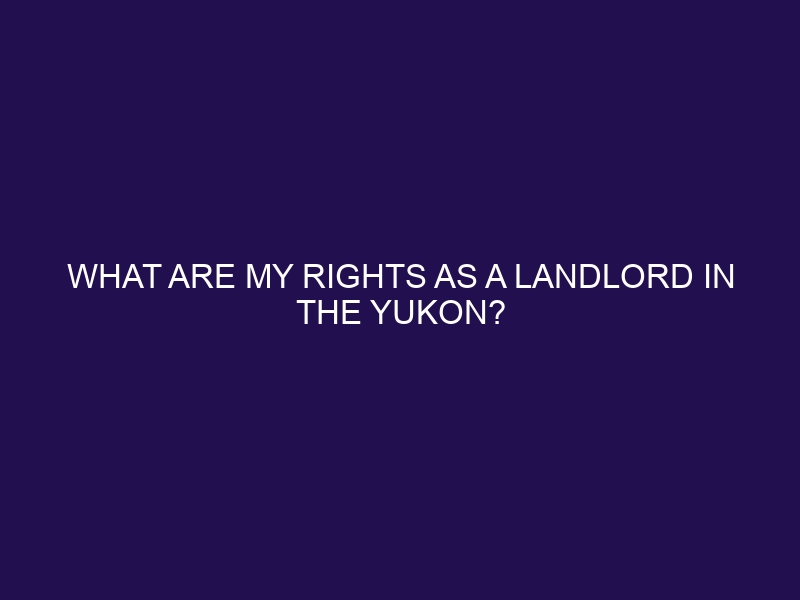What are my rights as a landlord in the Yukon?
.jpg)
The role of a landlord comes with specific rights and responsibilities, which vary depending on the jurisdiction. In the Yukon, landlords are governed by the Residential Tenancies Act. This act outlines the rights and obligations of both landlords and tenants, ensuring a fair and harmonious renting experience.
The Residential Tenancies Act applies to all rental properties in the Yukon, including residential homes, apartments, and condos. Landlords in the Yukon have several important rights that they should be aware of. These rights include the right to collect rent, set the terms and conditions of the tenancy, enter the rental property under specific circumstances, and evict a tenant in accordance with the law.
Alongside these rights, landlords also have certain responsibilities and obligations. They are responsible for maintaining the rental property, making necessary repairs, and providing essential services such as water and heat. Furthermore, landlords must respect tenant privacy and abide by legal guidelines regarding entry to the rental property.
In addition to the core rights and responsibilities, there are other considerations that landlords in the Yukon should be mindful of. This includes handling security deposits in accordance with the law and knowing the appropriate procedures for resolving disputes and addressing any issues that may arise during the tenancy.
By understanding these rights, responsibilities, and additional considerations, landlords in the Yukon can ensure a smooth and lawful rental experience for both themselves and their tenants. It’s important to familiarize oneself with the specific regulations outlined in the Residential Tenancies Act to ensure compliance with the law.
Key takeaways:
- The Residential Tenancies Act in the Yukon grants landlords the right to collect rent from tenants, set the terms and conditions of the tenancy, enter the rental property, and evict tenants if necessary.
- Landlords in the Yukon have responsibilities and obligations, including maintaining the rental property, making repairs and providing essential services, and respecting tenant privacy.
- Landlords should be aware of additional considerations, such as handling security deposits and dealing with disputes and issues, in order to understand and protect their rights in the Yukon.
Understanding the Residential Tenancies Act
It is crucial for landlords in the Yukon to understand the Residential Tenancies Act, as it outlines their rights and obligations. This act provides a legal framework for rental agreements, including important topics such as rent increases, lease termination, and repairs. Additionally, it covers tenant rights, such as the right to quiet enjoyment and proper notice of inspections. To ensure compliance and avoid potential legal disputes, landlords should familiarize themselves with the Act. It is recommended to consult with legal professionals or government-provided resources to gain a comprehensive understanding of the Residential Tenancies Act.
What is the Residential Tenancies Act?
The Residential Tenancies Act in the Yukon is a legislation that governs the rights and responsibilities of both landlords and tenants. It provides a framework for resolving disputes and establishes guidelines for rental agreements. This act applies to all residential rental properties in the Yukon, including houses, apartments, and mobile homes. It outlines a landlord’s right to collect rent, set the terms of the tenancy, enter the rental property, and evict a tenant under specific circumstances. Additionally, it outlines the obligations of landlords, such as maintaining the rental property and providing necessary repairs and essential services. It is crucial for landlords in the Yukon to understand the Residential Tenancies Act in order to protect their rights and ensure compliance with the law.
If you are a landlord in the Yukon, it is recommended to familiarize yourself with the Residential Tenancies Act and seek legal advice if needed. Understanding the legislation will not only help you navigate the rental process more effectively but also ensure a positive and lawful relationship with your tenants. So, what is the Residential Tenancies Act? It is a legislation that governs the rights and responsibilities of landlords and tenants in the Yukon.
Who Does the Residential Tenancies Act Apply to?
The Residential Tenancies Act applies to landlords and tenants in the Yukon. It provides a legal framework and guidelines for both parties involved in a tenancy agreement. Landlords who own rental properties in the Yukon are obligated to follow the rules outlined in the Residential Tenancies Act. This includes setting rental terms and conditions, collecting rent, entering the rental property for inspections or repairs, and the right to evict tenants if necessary. Tenants also have rights under this act, such as the right to a safe and habitable living environment and privacy. It is important for landlords and tenants in the Yukon to familiarize themselves with the Residential Tenancies Act to ensure their rights and obligations are upheld.
Pro-tip: Landlords and tenants should seek legal advice or consult the Residential Tenancies Act directly to fully understand their rights and responsibilities in the Yukon. Who Does the Residential Tenancies Act Apply to?
Important Rights for Landlords in the Yukon
As a landlord in the Yukon, it’s crucial to understand your important rights. From collecting rent to setting tenancy terms, entering the rental property, and even the right to evict a tenant, each sub-section will shed light on a specific aspect of your rights in this region. So, buckle up and prepare to unravel the key rights that come with being a landlord in the Yukon!
The Right to Collect Rent
The right to collect rent is one of the crucial rights that landlords in the Yukon have. This important right enables landlords to receive payment for the use of their rental property. It is vital for landlords to establish clear terms and conditions regarding rent collection in the tenancy agreement. Landlords are responsible for providing tenants with convenient payment methods and maintaining accurate records of rent payments. In the event of non-payment, landlords have the right to take legal action or pursue eviction proceedings. Familiarizing themselves with the Residential Tenancies Act is important for landlords to ensure they exercise this right within the boundaries of the law.
The Right to Set the Terms and Conditions of the Tenancy
As a landlord in the Yukon, you have the right to determine and establish the terms and conditions of the tenancy. This grants you the authority to create rules and regulations that tenants must abide by while occupying your rental property. It is crucial to effectively communicate these terms and conditions within the lease agreement to prevent any potential misunderstandings. Some commonly included terms might encompass limitations on pet ownership, smoking regulations, and noise level restrictions. By exercising this privilege, you can guarantee the proper maintenance of your property and ensure that tenants adhere to the rules you have put in place. It is important, however, to maintain a fair and reasonable approach when setting these conditions in order to foster a positive relationship with your tenants.
The Right to Enter the Rental Property
As a landlord in the Yukon, you have The Right to Enter the Rental Property under certain conditions. This right is important for various reasons, such as conducting inspections, making repairs, or showing the property to potential tenants. It is vital to respect the tenant’s privacy and follow legal procedures. For example, you must provide notice before entering, usually 24 hours in advance, unless it is an emergency situation. By understanding and adhering to the regulations outlined in the Residential Tenancies Act, you can exercise your right to enter the rental property while maintaining a respectful and professional relationship with your tenants.
The Right to Evict a Tenant
- In the Yukon, landlords have the right to evict a tenant under certain circumstances. It is important to understand the process and follow the necessary steps to ensure a smooth eviction.
- Here is a step-by-step guide on how to evict a tenant in the Yukon:
- Review the Residential Tenancies Act and familiarize yourself with the specific grounds for eviction.
- Provide written notice to the tenant outlining the reason for eviction and the date by which they must vacate the premises.
- If the tenant refuses to leave, apply to the Yukon Residential Tenancy Office for an eviction order.
- Attend the eviction hearing and present your case with supporting evidence.
- If the eviction order is granted, serve the tenant with the order and arrange for law enforcement to enforce it if necessary.
Pro-tip: It is advisable to seek legal advice and follow the proper legal procedures when evicting a tenant to ensure compliance with the Residential Tenancies Act and protect your rights as a landlord.
Responsibilities and Obligations of Landlords in the Yukon
In the world of being a landlord in the Yukon, it’s crucial to understand your responsibilities and obligations. We’ll dive into the key aspects that define your role, such as maintaining the rental property, making repairs, providing essential services, and respecting tenant privacy. Get ready to explore the ins and outs of being a landlord in this beautiful territory, and learn what it takes to uphold your duties with finesse.
Maintaining the Rental Property
Maintaining the rental property is an essential responsibility for landlords in the Yukon. To ensure the property remains in good condition, landlords should follow these steps:
- Regularly maintain the rental property by conducting inspections to identify any maintenance issues.
- Address repairs and maintenance requests promptly to uphold the standards of the property.
- Take care of the cleanliness and hygiene of common areas to provide a comfortable living environment.
- Regularly service and maintain the heating, plumbing, and electrical systems to ensure their proper functioning.
- Pay attention to the exterior of the property, which includes landscaping and snow removal, to enhance its overall appearance.
- Ensure proper waste management and garbage disposal to keep the property neat and clean.
- Regularly inspect and maintain fire safety equipment for the safety of tenants.
- Periodically review the condition of appliances and replace them when necessary to avoid any inconvenience to tenants.
- Implement preventive measures to minimize damage or wear and tear, thus prolonging the lifespan of the rental property.
By proactively maintaining the rental property, landlords can provide a safe and comfortable living environment for their tenants while preserving the value of their investment.
Making Repairs and Providing Essential Services
The responsibility of landlords in the Yukon includes making repairs and providing essential services. Here are the steps to effectively fulfill this crucial obligation:
- Regular Inspections: Conduct routine inspections to identify any repair or maintenance needs.
- Prompt Response: Respond promptly and within a reasonable timeframe to tenant requests for repairs and essential services.
- Hire Qualified Professionals: Engage licensed and qualified professionals for repairs and maintenance to ensure the delivery of quality work.
- Provide Notice: Inform tenants in advance about any planned maintenance or repair work that may cause temporary disruptions.
- Emergency Situations: Address emergency repair needs immediately to ensure the safety and well-being of tenants.
- Document and Keep Records: Maintain records of all repairs and services provided, including invoices, receipts, and communication with tenants.
- Follow Legal Requirements: Adhere to the Residential Tenancies Act requirements regarding repairs, maintenance, and the provision of essential services.
Respecting Tenant Privacy
Respecting tenant privacy is an important responsibility for landlords in the Yukon. It is crucial to maintain the confidentiality and security of tenant information and ensure their personal space is respected. Landlords should refrain from entering the rental property without proper notice, except in emergencies or with the tenant’s consent. Sharing tenant information with others should be strictly avoided, except when required by law. Violating tenant privacy can lead to legal consequences and damage the landlord-tenant relationship. A true story that highlights the significance of respecting tenant privacy involves a landlord who mistakenly entered a tenant’s apartment without notice, causing the tenant to feel violated and resulting in strained relations between them.
Additional Considerations for Landlords in the Yukon
As a landlord in the Yukon, there are additional considerations that can impact your role and responsibilities. In this section, we’ll take a closer look at key factors to keep in mind as you navigate being a landlord in this region. We’ll explore how to handle security deposits and tackle disputes and issues when they arise. By understanding these facets, you can better protect your rights and provide a positive rental experience for both yourself and your tenants.
Handling Security Deposits
Handling security deposits as a landlord in the Yukon involves following a few key steps to ensure compliance and protect both parties involved.
- Document the deposit: Start by creating a written agreement that clearly states the amount of the deposit and the conditions for its return.
- Hold the deposit securely: Place the deposit in a separate bank account to prevent commingling with personal funds.
- Provide a receipt: Give the tenant a receipt for the deposit payment as proof of transaction.
- Perform a move-in inspection: Conduct a thorough inspection of the rental unit before the tenant moves in. Document any existing damages with photos or a written report.
- Return the deposit: If the tenant meets all the terms of the lease agreement and leaves the unit in good condition, return the full deposit within the specified timeframe.
- Document deductions: If there are damages or outstanding rent, provide an itemized list of deductions along with any remaining balance.
- Communicate with the tenant: Keep open lines of communication throughout the process to address any concerns or disputes.
In a similar vein, it’s interesting to note that a true historical event relates to handling security deposits. In 2008, a landlord in the Yukon accidentally misplaced a tenant’s security deposit. Despite extensive searching, the deposit couldn’t be found. In good faith, the landlord refunded the full amount from their personal savings, highlighting the importance of responsible handling and transparency when it comes to security deposits.
Dealing with Disputes and Issues
Resolving disputes and issues, as a landlord in the Yukon, is a crucial aspect. Here are some steps to effectively handle such situations:
- 1. Communication: Engage in open dialogue with the tenant to comprehend their concerns and articulate your perspective.
- 2. Mediation: Consider the use of a mediator to facilitate a constructive conversation and discover a mutually acceptable solution.
- 3. Documentation: Maintain records of all communication, including agreements, notices, and repairs, to safeguard your interests.
- 4. Legal Assistance: In the event of the dispute escalating, consult with a lawyer experienced in landlord-tenant law to comprehend your rights and available options.
- 5. Dispute Resolution Services: Make use of the services provided by the Residential Tenancies Office to mediate and resolve conflicts.
Remember, fostering good communication and seeking professional assistance when necessary can contribute to dealing with disputes and issues smoothly.
Facts:
Some Facts About Your Rights as a Landlord in the Yukon:
- ✅ A written lease is not mandatory but strongly recommended for landlords and tenants in the Yukon. (Source: EZ Landlord Forms)
- ✅ Landlords are responsible for maintaining the rental premises in a good state of repair and must follow health, safety, and maintenance laws. (Source: EZ Landlord Forms)
- ✅ Rent receipts must be provided by the landlord upon request. (Source: EZ Landlord Forms)
- ✅ A security deposit in the Yukon cannot exceed the amount equal to the rent paid for the first month of tenancy. (Source: EZ Landlord Forms)
- ✅ The landlord needs 24 hours written notice to enter the rented premises, between 8 am and 9 pm, unless the tenant gives consent or in case of an emergency. (Source: EZ Landlord Forms)
Frequently Asked Questions
What are my rights as a landlord in the Yukon?
As a landlord in the Yukon, you have certain rights and responsibilities. Here are some frequently asked questions regarding your rights:
Can I enter the rental premises whenever I want?
No, you cannot enter the rental premises without providing proper notice. You must give the tenant 24 hours’ written notice before entering, except in the case of an emergency or if the tenant gives consent.
Can I assign or sublet the rental property?
Yes, you can assign or sublet the rental property with the written consent of the tenant. However, you cannot unreasonably withhold this consent.
Do I need to have a written lease agreement?
A written lease agreement is not mandatory in the Yukon, but it is strongly recommended for both landlords and tenants. If the agreement is written, it must be signed by both parties, and a duplicate copy should be provided to the tenant within 21 days.
Can I increase the rent whenever I want?
No, you cannot increase the rent anytime you want. Rent increases are not permitted for tenancies less than 1 year or in the first year of a tenancy. If you wish to increase the rent, you must serve a notice of increase at least three months in advance.
Do I need to provide rent receipts to tenants?
Yes, as a landlord, you must provide rent receipts to your tenants upon request. It is important to keep a record of rent payments and provide documentation to the tenants as needed.
What should I do at the end of a tenancy?
At the end of a tenancy, you should conduct a condition inspection report, which must be signed by both you and the tenant. Damages may only be deducted from the security deposit if a condition report is signed. You are also required to return the security deposit within 15 days of the tenancy’s termination.







